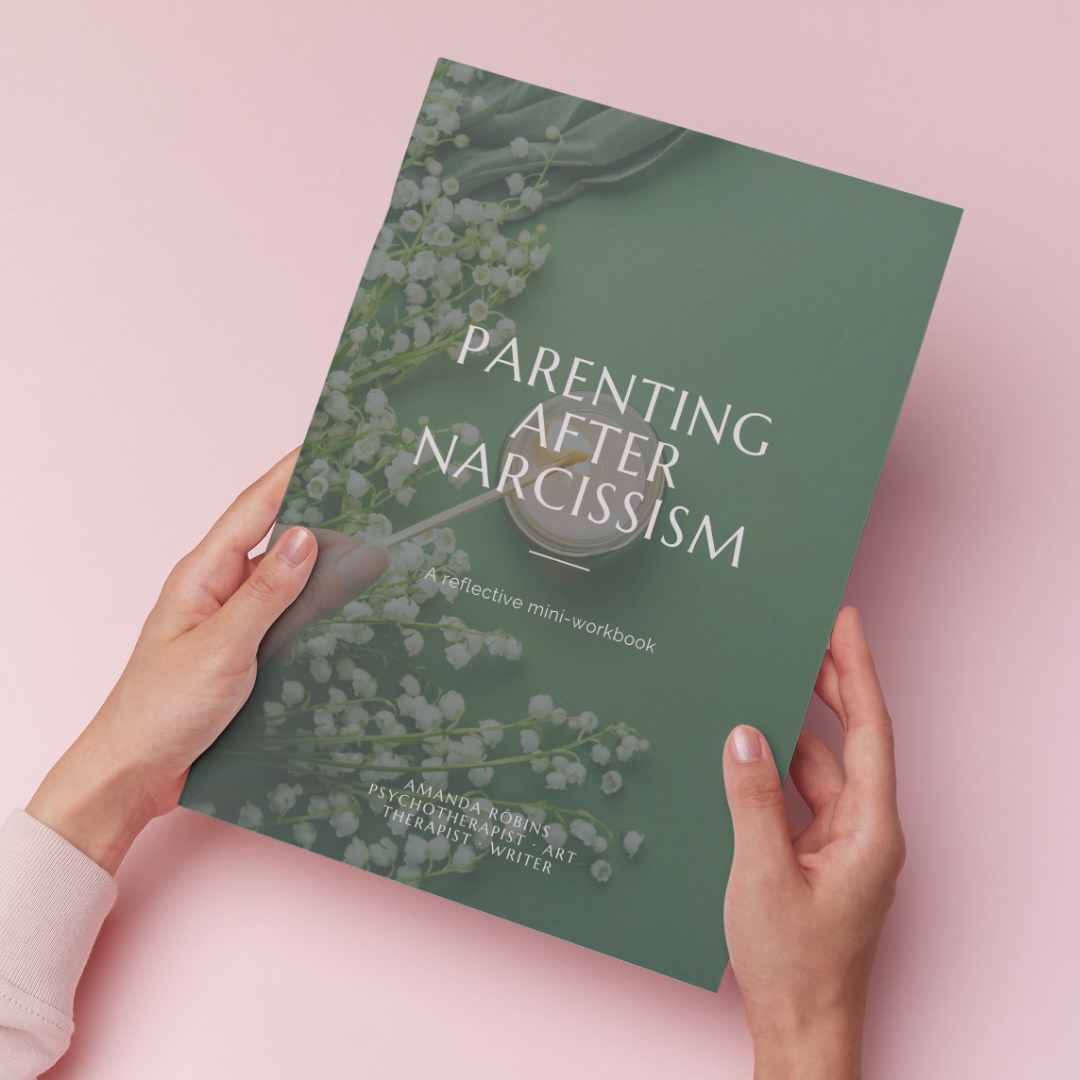Mothering After a Narcissistic Upbringing: What Daughters Need to Know
Introduction
For those of us raised by narcissistic mothers, the thought of becoming a parent can stir up deep, complex emotions. You may feel fear, confusion, or doubt about your ability to parent in a healthy way. You might worry about turning into your mother — or hurting your children in the same ways you were hurt.
In my practice, I have seen many women who bring up this fear in the therapy room. For some, therapy is the only place they can discuss it. Some have put off having children, not because they don’t want them, but because they fear repeating the past. The good news? Awareness is the first and most powerful step in breaking generational patterns. It means you’re already doing the work that will eventually make you a better or “good enough” parent.
1. Understand What Narcissistic Parenting Looks Like
Before you can avoid repeating the pattern, you need to understand it.
Narcissistic mothers often:
Use their child for emotional support or validation. Narcissists often expect their children to be there for them, failing to understand or acknowledge the child’s own emotional needs (This is often called “parentification”)
Are critical, controlling, or jealous of their daughter, particularly at puberty when the young girl is becoming a woman
Offer love conditionally — based on obedience, success, or how your behaviour, actions or appearance reflect on them
Struggle to see their child as a separate person with their own individual needs and desires
Enmesh their children, blurring boundaries and creating confusion around identity
Ask yourself:
Which of these patterns did I experience?
How did they shape my sense of self?
What kind of mother do I wish I’d had?
Many of these questions are best explored within the safe space of a therapeutic relationship. Often daughters raised by narcissistic mothers will have ongoing issues with self-worth and identity. It can take time to heal, but continuing to reflect on your early experience will allow you to process some of your trauma. A skilled trauma therapist can help you come to terms with your childhood and learn to hold the “unheld parts” of yourself with love and compassion. Therapy can help you reparent yourself before you become a mother.
2. Face your Fear of Repeating the Pattern
Many daughters of narcissistic mothers carry a quiet but persistent fear: What if I become like her? Often my clients question whether they themselves are narcissistic and whether they will damage their own children.
When Aviva walked into my office, she didn’t seem typical of the clients I see. Intelligent, softly spoken and creative, she hid her wounds under a facade of strength and tolerance. She was undoubtedly both of those things, but she was also intensely vulnerable and wounded.
Aviva’s mother was narcissistic. Growing up in a large dysfunctional family, Aviva had to run the gamut of managing her own sensitive temperament whilst also providing ongoing emotional support for her needy and fragile mother.
Aviva’s primary affect seemed to be sadness and grief. She had experienced so many losses, not just the permanent absence of a stable attachment figure, but the loss of beloved friends and relatives who had died too early. It had been impossible for her to grieve, because she had no internal safe attachment history to fall back on.
Now she had her own baby and was scared of her own early experiences. Was she worthy of this gift? Would she turn into her mother and wound her son? In therapy we worked together to process some of her trauma. To allow her to see both her good side and the inevitability of imperfection in parenting. I reassured her with the obvious truth. She had already broken the cycle through empathy. I knew instinctively that she was a good mother. I just had to convince her.
The therapy helped her heal and become a better parent, but we also worked on managing her relationship with her mother in the present. I supported her in setting boundaries and understanding her mother’s behaviour. Underneath their fraught interactions lay the reality that Aviva was continually irritated by her mother. Although justified, Aviva’s irritation got in the way of them enjoying the relationship for what it was. In turn, her mother was often scared of her, feeling like she had to tread on eggshells around her daughter.
As Aviva came to accept her mother’s limitations, she relaxed and became much more comfortable around setting limits and saying no to her mother’s demands. That included not allowing unsupervised access to her son, because she just couldn’t trust her mother to provide an emotionally safe environment for him. This was a big step, but helped Aviva feel better about her mother as a grandparent. Overall, their relationship improved. Aviva’s mother hadn’t changed, but she had.
Your fear of turning into your mother is valid — but it’s also a powerful sign of your self-awareness.
Reframe the fear:
The fact that you’re worried shows your empathy and reflection — qualities narcissistic parents typically lack.
You’re already interrupting the cycle simply by asking these questions and seeking another way.
3. Do the Inner Work First
Unhealed wounds will shape how we parent — unless we consciously process them. Before (or alongside) becoming a mother, consider:
Therapy, especially trauma-informed or inner child work, to explore unmet needs and core beliefs.
Reparenting yourself by learning to meet your own emotional needs with care and consistency.
Ask yourself:
Can I self-soothe when triggered?
Can I tolerate my own — and my child’s — emotional distress without trying to control it?
4. Learn Healthy Attachment and Boundaries
Growing up with a narcissistic parent can distort your understanding of what healthy love and boundaries look like. If you have been raised by a narcissistic mother, you may not have had a model of secure attachment or mature relationships. These first relationships underpin our capacity to love, and to parent.
Commit to learning:
How to be emotionally attuned so that your child feels safe and understood
How to be present and responsive without being controlling
How to set healthy boundaries
How to manage your own anxiety so that your child can explore and take (reasonable) risks without feeling the need to interfere
When to safely let go and when to intervene
Read about:
Developmentally appropriate autonomy
Emotional co-regulation (learning to calm yourself and your child without shame or threat)
5. Don’t Aim to Be a Perfect Mother — Just a “Good Enough” One
Daughters of narcissistic mothers often feel intense pressure to be “perfect” parents — to give their children everything they missed out on. But perfectionism is a trauma response. Daughters will often carry into adulthood the shame they experienced as children. This shame is triggered when they appear less than perfect, when they make a mistake or slip up. But your children don’t need perfection, they need attunement and repair when things go wrong. Accepting your own imperfections and managing your anxiety is part of the journey to healthy parenting.
Aim to:
Be emotionally available
Repair when you make mistakes (because you will — and that’s okay)
Model vulnerability, boundaries, and self-compassion
Your child doesn’t need a perfect mother. They need a present, safe, and emotionally attuned one.
6. Build a New Support System
Narcissistic mothers often isolate their daughters or undermine other relationships, leaving them without a strong support system.
Start building one now:
Cultivate friendships with emotionally safe people
Join parenting or therapy groups aligned with your values
Set healthy boundaries with your mother, if needed
Ask yourself:
Who helps me feel grounded, not drained?
Can I ask for help without guilt or shame?
7. Consider Your Relationship with Your Mother Before Becoming One
If your mother is still in your life, take time to reflect on her potential role.
Ask:
What role will she play in your child’s life?
Will she respect your boundaries as a parent?
Can I manage the emotional burden of being both daughter and mother at the same time?
You may need to take space or set firm boundaries before your baby arrives. That isn’t selfish — it’s protective and wise.
8. Give Yourself Permission to Parent Differently
You are not your mother.
You may grieve what you didn’t receive. You may feel awkward showing affection or holding firm limits at least in the beginning. That’s okay.
Motherhood can be healing — but only if it’s done consciously. For some women who’ve experienced trauma in early childhood, unconscious material can interrupt their capacity to parent, especially if the trauma is unhealed. If you are continually triggered by your own child, you won’t be able to parent effectively. These emotional wounds can be opened up and gently explored in therapy so that you aren’t overwhelmed in your new role. Of course, some new mothers are naturally attuned and empathetic - even if they have never received this from their own parents. But its wise to take stock and make sure you have some supports around you, at least in the first few months.
You don’t have to do it perfectly. You just have to parent differently, with love and intention.
Closing Thoughts: You Are Not Doomed to Repeat the Past
If you’re even thinking about these issues, you’re already starting to break the cycle.
There is no perfect way to parent — but there is a conscious way. One that honours your child’s needs and your healing.
You are not doomed to become your mother. You have the power to become the parent you always needed — for your children, and for yourself.
FREE GUIDE: Parenting After a Narcissistic Upbringing
I’ve written a free guide — Parenting After a Narcissistic Upbringing — that explores these issues in more depth. It offers reflection points, practical insights, and gentle reminders that your parenting story does not need to mirror the one you inherited.












Parentification happens when a child is pushed into adult roles—emotionally, practically, or both—long before they are ready. This article explains how parentification develops, why it is common in narcissistic families, and the lasting impact it has on self-worth, boundaries, and adult relationships.